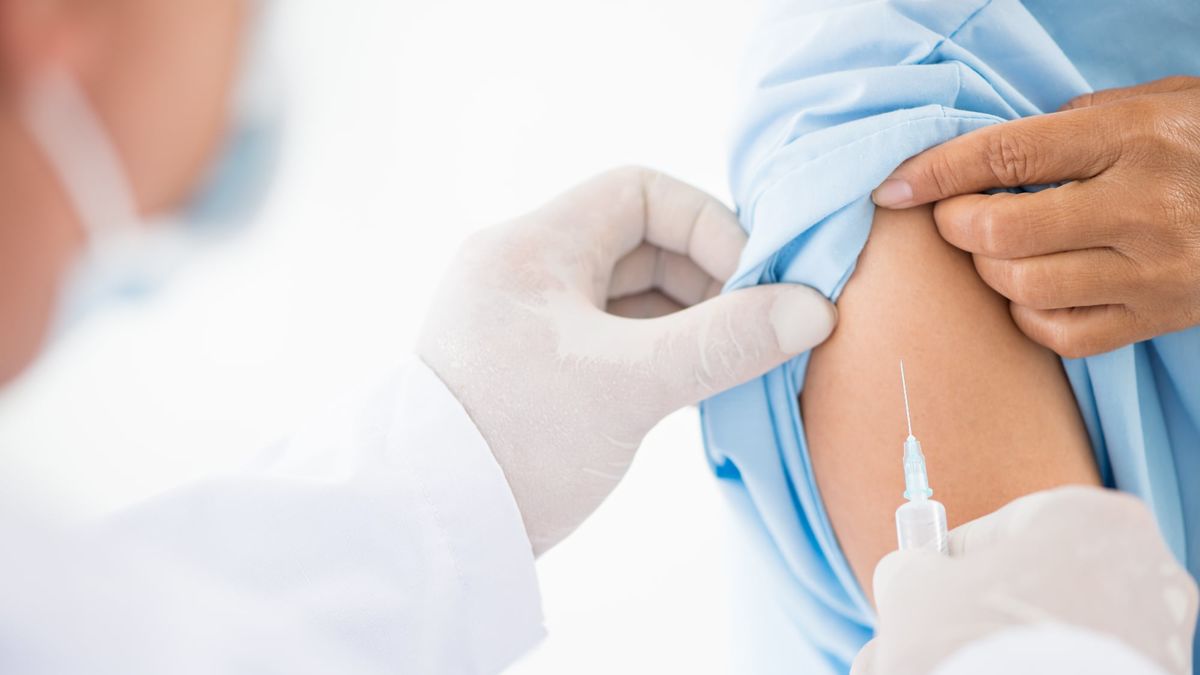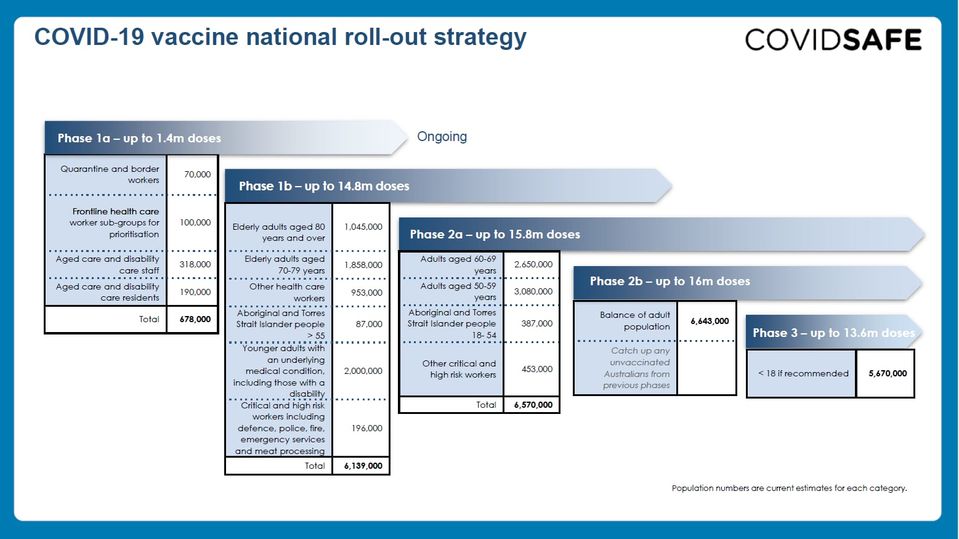Vaccination for most travellers available from mid-year
Unless you belong to a 'priority group', your COVID shots won't be likely until the back half of 2021.

Most Australians eager to travel overseas will be eligible for their free COVID-19 vaccination from the middle of the year under the government's national vaccine roll-out plan.
Prime Minister Scott Morrison said today that under an accelerated timetable and pending approval of the Pfizer-BioNTech vaccine by the end of January, "we are now in a position where believe we will be able to commence vaccinations of [vulnerable groups] in mid to late February."
Approval of the Oxford-AstraZeneca vaccine, which is already being administered in the UK and will be largely manufactured in Melbourne by biotechnology company CSL in February, is expected to follow in February with availability in March.
The vaccination timetable is divided into three phases based on people's risk factors, with up to 60 million doses.
As each vaccine requires two injections – a starter and a booster, with 3-6 weeks between them – this will cover Australia's population of 25 million with capacity to spare.
Morrison said the aim would be to vaccinate 80,000 people each week to begin with, and for that to build over the next four to six weeks until four million people in the highest-risk group vaccinated by the end of March.
Speaking at the same media briefing, Federal Health Department Secretary Professor Brendan Murphy said that almost half of Australians would fall within one of the 'priority groups' slated to receive the vaccine in the first half of this year.
The vaccination timetable
Phase 1 would encompass almost 7 million Australians including quarantine and border workers, health care workers, aged care and disability care staff and residents, adults aged 70 and over, younger adults with underlying medical conditions, critical and high risk workers (such as defence, police, fire and emergency services) and Aboriginal and Torres Strait Islanders aged 55 and over.
Another 6.5 million Australians fall into Phase 2a: among them are adults aged 50 years and over, Aboriginal and Torres Strait Islanders from 18-54, and "other critical and high risk workers."
This leaves another 6.6 million Australian adults in Phase 2b, which Murphy expects to kick off mid-year, to be followed by Phase 3 for the estimated 5.7 million Australians under 16 years, if recommended.
Murphy said the majority of the population would receive their shots from special Health Department clinics and participating GP clinics and medical centres; pharmacies could also be able to administer the vaccine during the second half of the year.
No silver bullet
However, Prime Minister Morrison warned vaccination will not be a "silver bullet."
"There is a lot still to be learned about these vaccines... that’s why COVID-safe behaviours and other arrangements will still be necessary over the course of this year."
As previously reported, Qantas earlier this week began selling tickets for international flights from July 1 to Asia, the USA and London, which have largely been suspended since late March 2020.
A spokesman for Qantas told Executive Traveller this reflects its own expectations of a vaccine rollout and "that international travel will begin to restart from July 2021."
This earned a swift rebuke from Deputy Prime Minister Michael McCormack, who said "decisions about when international travel resumes will be made by the Australian Government. "International borders will be opened when international arrivals do not pose a risk to Australians."
Readers are asked to keep their comments on the topic of the vaccination rollout timetable and vaccination for travellers; comments will be held for approval and may be edited or not published, as we see fit.


03 May 2013
Total posts 684
This is the first bit of tangible and positive news Aussies have had since this all began. Very hopeful things may improve for us international business and leisure travelers.
09 Sep 2012
Total posts 139
Interesting that none of the PM, Greg Hunt or the Profs memtioned that the Astra-Zeneca vaccine is derived from an ethically and therefore totally unacceptable source, while the Pfizer vaccine, which cannot be produced in Australia, owing basically to stupidity, is acceptable to all.
Yet they intend to foist the Astra-Zeeneca on the masses.
24 Aug 2011
Total posts 1224
I would have thought people unnecessarily suffering and dying when we have access to something that avoids this is more unacceptable and unethical.
I think you are on the wrong website.
17 Jan 2017
Total posts 6
Can you elaborate. If there is a choice between the two, what should we know about the different vaccines to help us make an informed decision.
17 Jun 2020
Total posts 235
Good news, however from the sound bites so far it seems travel won’t be resuming until everyone who has had the opportunity to get the vaccine has been vaccinated.
Seems the focus initially is to vaccinate enough on the frontline with the intention quarantine remains for some time (hence border staff in phase one).
05 May 2016
Total posts 616
As expected based on that timetable my preferred time for my next trip in June/July this year would appear unrealistic. Looks like I'll have to aim for the end of the year.
Singapore Airlines - KrisFlyer
17 Nov 2014
Total posts 101
University academic should be deemed as "other critical and high risk workers", so that we will be able to return international students and save the struggling HE sector.
Qantas
19 Apr 2012
Total posts 1429
I think vaccine will be enough for Australian’s to leave but not necessarily to come back without some form of quarantine until the end of the year when most will be vaccinated and we know more about infectiousness of vaccinated people and the sort of symptoms vaccinated people have when they have the bug.
24 Aug 2011
Total posts 1224
Probably correct. It will also depend on how other countries go with the roll-out of their vaccination programs. The government will be keen that they only reopen traffic with countries where the chances of importing virus are low.
Fortunately, it appears that programs are commencing across the world in places as varied as India, Indonesia, China, North America and Europe. Obviously, support will be required for third world countries.
Australia has a responsibility to assist South Pacific nations and some of the A-Z vaccinations already ordered have been assigned to be administered by AusAid into countries such as PNG and Vanuatu. Hopefully other first world nations step up and assist in other parts of the world similarly.
Thai Airways International - Royal Orchid Plus
15 Jan 2013
Total posts 461
madness.my workplace needs the airline contract and there are lots of us who have missed out on holidays this year.i am hoping they drop by december this year if its singapore or hong kong or japan the stupid at close to three grand quarantine rules which means exactly that,conditions of which you get luxury but no access to the same things as other guests so otherwise prison conditions.
06 Oct 2018
Total posts 12
I say bring it on and get out of there!
Qantas - Qantas Frequent Flyer
31 Aug 2012
Total posts 212
I am wondering two things: Who is getting which vaccine? I assume (maybe incorrectly) that the Phase 1 people will get the Pfizer shots, with later Phase folk more likely to get the AstraZeneca variety.
Secondly, will (fully vaccine certified) returning travellers be subject to hotel quarantine on return? What documentation will the government provide to those correctly vaccinated?
05 Mar 2015
Total posts 422
From reports I read yesterday, Phase 1a will get the Pfizer vaccine, Phase 1b could be a mix of Pfizer and Oxford, but as 50 million doses of the Oxford vaccine will be manufactured in Melbourne and the Oxford vaccine doesn't need the ultra-low temperature handling of the Pfizer vaccine, the Oxford vaccine is the one would will be more broadly available for Phase 2 onwards.
As to vaccinated travellers being subject to quarantine, that's the big question, because while the vaccine should stop you from getting sick from COVID it's not known if it will stop you passing on the virus to other people. In other words you could end up like an asymptomatic carrier who shows no sign of infection but can infect others. In that case quarantine would still be a must.
I expect that in the shorrt term we will see preflight testing and rapid testing for Australians departing the country even to visit other countries such as NZ and Singapore, with people getting vaccinated also as much for their own protection as anything else. I'm not sure that vaccination by itself will 'unlock' international travel in a hurry.
Qantas - Qantas Frequent Flyer
11 Oct 2014
Total posts 688
Whilst it is great that the Federal Government seems to have been able to speed up the TGA (Therapeutic Goods) ' approval process, it does not imply that we re out of the woods yet.
There are still a hell of a lot of things the manufacturers, Governments, Health Department and Medical Officers have yet to learn about these products. So far, all countries currently vaccinating their populations are doing so using 'Emergency' approvals. This includes the UK, USA, Canada, Israel for Western-sourced products, China and Russia (using their own home-grown products).
The technologies that these vaccines are developed on are equally varied and it is a credit to the industry that it has been able to produce vaccines so quickly, given that the usual time to achieve a similar result is typically 10 years or more.
However, we are globally at a very early cusp in the testing / approval process. Most studies, regardless of brand / company has been conducted on sample sizes of approximately 30-35,000 participants.
Some relevant facts:
For the above reasons, it is fairly obvious that the Australian Government wants to formally test the end-product, rather than shuffle through an 'Emergency' use approval. Smart move, given that - as a country - we are comparatively better off than most other countries worldwide and do not have the immediate need to adapt our health system to cope to pandemic concerns.
It is also the reason that quarantine will be with us for a considerable period of time.
Singapore Airlines - KrisFlyer
02 Dec 2016
Total posts 47
Nobody will want to go overseas if they have to quarantine for 2 weeks during the arrival and departure phases. Personally, i believe that once you get vaccinated, you don't have to be quarantined and get tested pre flight etc.
Qantas - Qantas Frequent Flyer
31 Aug 2012
Total posts 212
I imagine that the answer to @Hornet is that it will be a 'take it or leave it' situation as far as choice of vaccine is concerned. As things stand today I would definitely choose the Pfizer shot given the choice.
In light of reported news today that AstraZeneca has done insufficient testing on over-60s, the Pfizer should be reserved for that cohort irrespective of which group they presently fall. Even in the highest priority groups with working-age people the AstraZeneca should be appropriate, provided no further negative revelations surface.
Hi Guest, join in the discussion on Vaccination for most travellers available from mid-year